
Java Jive's first premises in the late 1980s, College Hill, Ponsonby. - Chris Priestley Collection
Originally a family restaurant with live music one night a week, Ponsonby’s Java Jive Café opened in the mid 1980s in the Hydra Bacon building on College Hill. It moved around the corner to Pompallier Terrace in 1989 where it grew to be a thriving late-night hot spot with music every night of the week until its demise at the beginning of 2004.
When contemporary folk musician Chris Priestley sold his share in Real Groovy Records in 1985, he and wife Laurel teamed up with Sally Fowler and Larry Griffin, who had run Harvest Wholefoods next door to Real Groovy’s Grey Lynn predecessor Notoriety, to enter the hospitality industry.
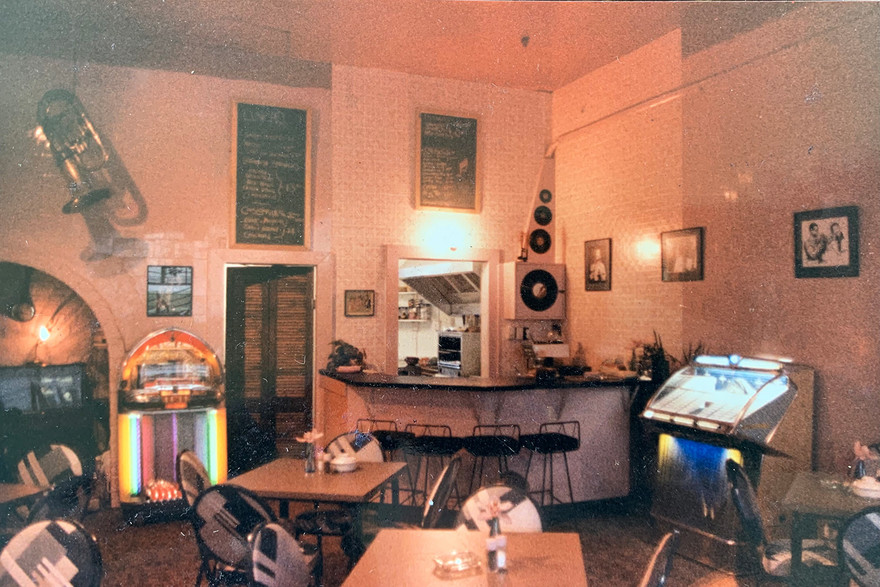
Interior of the original Java Jive, College Hill, Ponsonby. - Chris Priestley Collection
They found an old Auckland Meat Company butcher’s shop two or three doors down from Ponsonby Road, and Java Jive Café was opened on College Hill on Sunday 25 May 1986. Chris Priestley named it after ‘Java Jive’, a 1940 pop song by The Ink Spots.

Java Jive opens on College Hill, Sunday 25 May 1986. - Chris Priestley Collection
“It had beautiful character to it,” he said. “It was only big enough to fit … I think we had nine tables plus a piano and the two jukeboxes. We were BYO, and there were about four things on the menu; you could have beef nachos or vegie nachos, beef curry or vegie curry, and kebabs.”

Chris Priestley with blues legend Brownie McGhee at Java Jive, Ponsonby, 1980s. - Chris Priestley Collection
The initial jukebox, a beautiful 1959 Wurlitzer, held a paltry dozen 78rpm records at a time and played only one side of each. It was stocked with some of Priestley’s Real Groovy leftovers such as ‘Lucille’ by Little Richard, ‘Klact-Oveeseds-Tene’ by Charlie Parker, and others by Bessie Smith, Django Reinhardt, Muddy Waters, and Elvis Presley.

Acoustic Confusion at Java Jive, College Hill, Ponsonby (L-R): Phil Powers, Denny Stanway, Julian McKean, and Chris Priestley. - Chris Priestley Collection
“Nobody in the country had a jukebox that looked like that,” Priestley said. “But after a while we realised that 12 songs wasn’t good enough.” Collector Richard Goulding hooked them up with a 200-play Wurlitzer 1015 which Priestley filled with 45s from his own collection. Touring blues artists Brownie McGhee and Champion Jack Dupree paid Java Jive a visit after being told their records were in the jukebox there.

Ross Mullins at Java Jive, Auckland, with Kath Tait, 1986. - Ross Mullins collection
Several musicians were employed as cooks, dishwashers and waiters including Mahinaarangi Tocker, Kath Tait and members of Headless Chickens. Laurel Priestley and Sally Fowler would do the prep work during the day and Chris Priestley would do the night shift.
“It got to a point where all the tables would be full and there’d be, like, five or six waiting; we didn’t take phone bookings,” he said. “We’d send them to The Gluepot for a drink and save them a table. Never used to write anything down because that was far too organised. We were turning away heaps every day.”
During the first four years Java Jive was geared towards family dining with music on Sundays and an occasional special concert. The 358’s, featuring Denys Mason and Lance Su’a, played once a month or so and there were concert appearances by the likes of Lorina Harding, Brendan Power, Beverley Young, Jean Reid, Mahinaarangi Tocker, and Marion Arts and Robbie Lavën.

Mahinaarangi Tocker performing at the College Hill premises of Java Jive. At right, Mahinaarangi with Lynn Campbell and Peter Tait. - Chris Priestley Collection

Java Jive performers at the College Hill premises. Left: Cath Woodman. Right: Phil Powers. - Chris Priestley Collection
After it was announced the Hydra Bacon factory would be closed in readiness for demolition, Priestley found a new space down a flight of stairs on Pompallier Terrace, underneath the new ANZ building on the corner of Ponsonby Road.
“Pompallier Terrace was the least likely place,” Priestley said. “There’d been nothing there. It was four grey concrete-block walls down some stairs, basically, and that was it. No windows. It had nothing going for it, no parking. You’d think, ‘How are we going to make this into something?’”
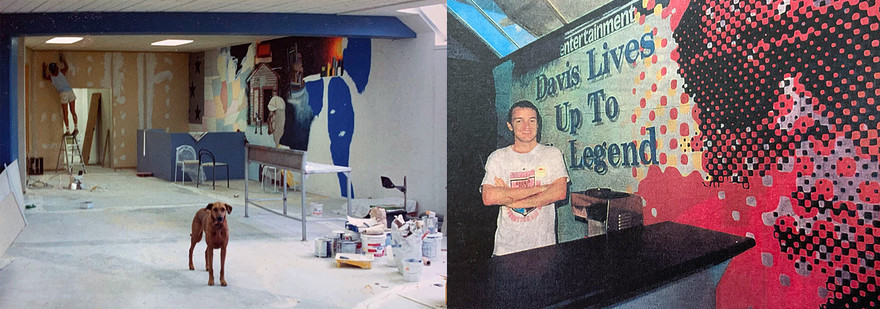
The second premises of Java Jive at Pompallier Terrace with artist Martin Page's blues-to-jazz mural underway. At right, Page stands at the Miles Davis end of his completed mural. - Chris Priestley Collection
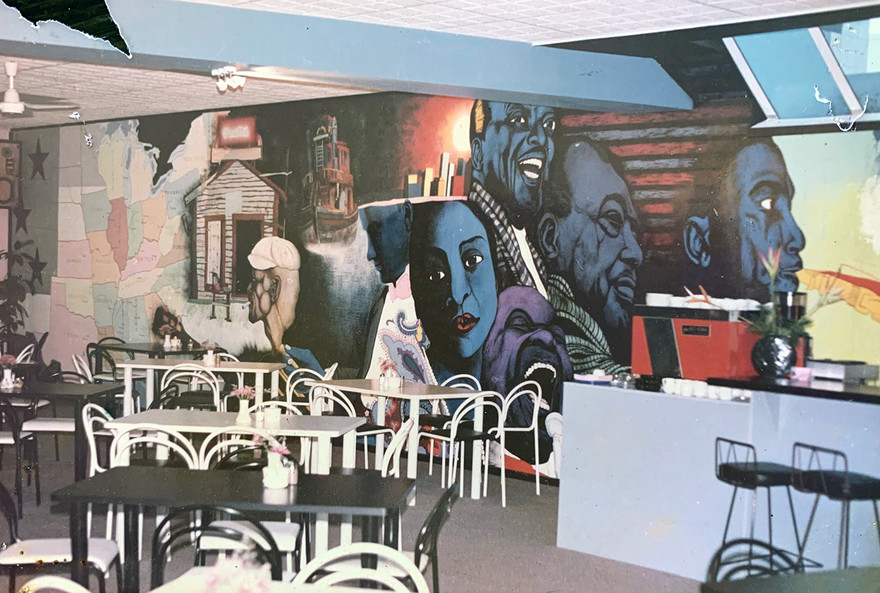
Martin Page's completed mural at Java Jive, Pompallier Terrace. - Chris Priestley Collection
But Priestley had a vision. He commissioned artist Martin Page to paint a mural along one wall depicting the history of American music from Mississippi blues to Miles Davis and Charlie Parker. On the others, he hung his collection of second-hand trombones, tubas and 78 records of various circumferences alongside photos of Thelonious Monk and Duke Ellington he’d found in a book and had enlarged. And he moved the 1015 jukebox in from College Hill.
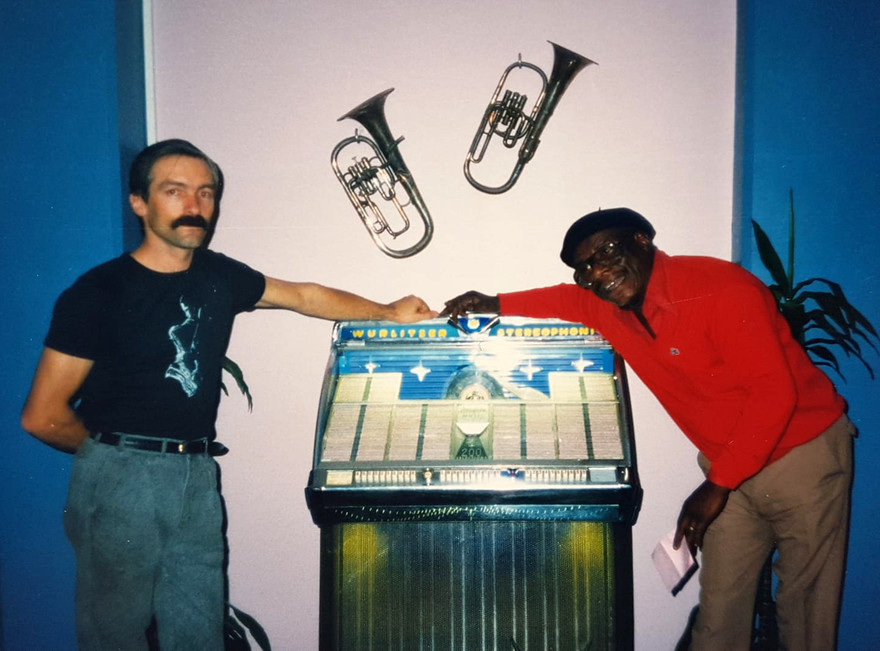
Chris Priestley at the Java Jive jukebox with US jazz double-bassist Larry Gales. - Chris Priestley Collection
Still trading as a BYO restaurant with occasional music, the new Java Jive Café opened around March or April 1989 and was packed by 6:30pm from then on. “When we moved to the new Java Jive, it had 20 tables. It was 10pm closing at Hydra, but now it had to be a bit later,” Priestley said.
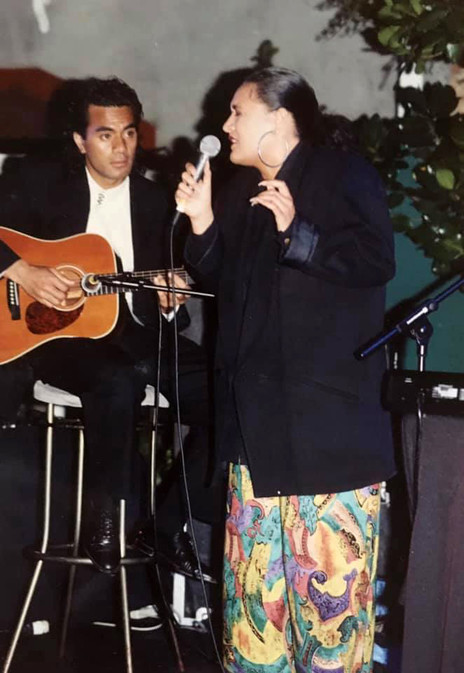
Lance Sua and Annie Crummer, Java Jive, College Hill, Ponsonby - Chris Priestley Collection
“We weren’t licensed, we were more into a family place with music, because I never did like drunks and 2am or 3am finishes. It started heading in that direction because everybody wanted to stay late. I was more of a daytime person, so it didn’t suit me. I don’t mind going out at night but then I like to go to bed. I didn’t want to be there all the time.”
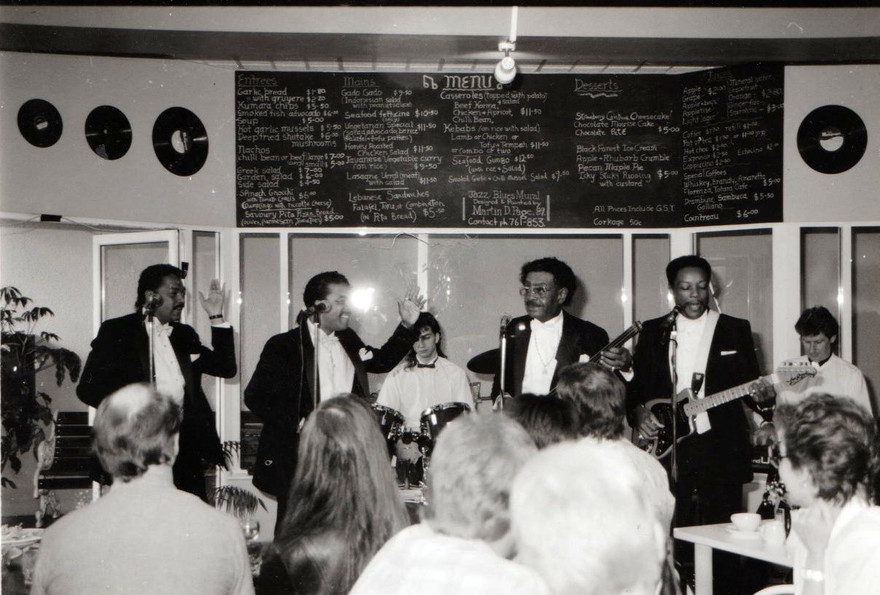
The Ink Spots performing at Java Jive, Pompalier Tce, Ponsonby, with Liam Ryan on keyboards. - Chris Priestley Collection
One of Priestley’s best memories from the new location was when The Ink Spots, whose song the café had been named after, performed a lunchtime concert. Nearly 50 years after releasing ‘Java Jive’ and with one remaining member from that time, The Ink Spots were touring RSAs and workingmen’s clubs. When they learned there was a venue named after the song, they asked if they could play there.

Autographed poster from the Ink Spots' appearance at Java Jive, 1989. - Chris Priestley Collection
Also in attendance were promoter and Gluepot bookings manager Paul Walker and his wife Beaver. They became semi-regular patrons and over the following weeks talk turned to Walker buying the business. At the end of 1989, he and partner Julian Spiller did just that. Two other partners departed quick smart when Walker and Spiller revealed their plans for the place in the wake of the Sale of Liquor Act 1989.
“It was a very successful food restaurant in Ponsonby,” Spiller recalled. “It was cheap, it was quick and quite successful. It wasn’t licensed, so we licensed it. We thought, ‘How can we add value to it? We’ll license it!’ And the licensing had just changed from 10 o’clock to 3am. So, we were one of the first to get a 3am licence on Ponsonby Road.”
This meant that when the three Gluepot bars closed, patrons need only walk 200-odd metres to continue imbibing. Down the stairway from Pompallier Terrace, straight ahead were two or three steps up and a corridor leading to a private car park. Veer right before stepping up and you were in the bar, smoke hanging heavy in the air.
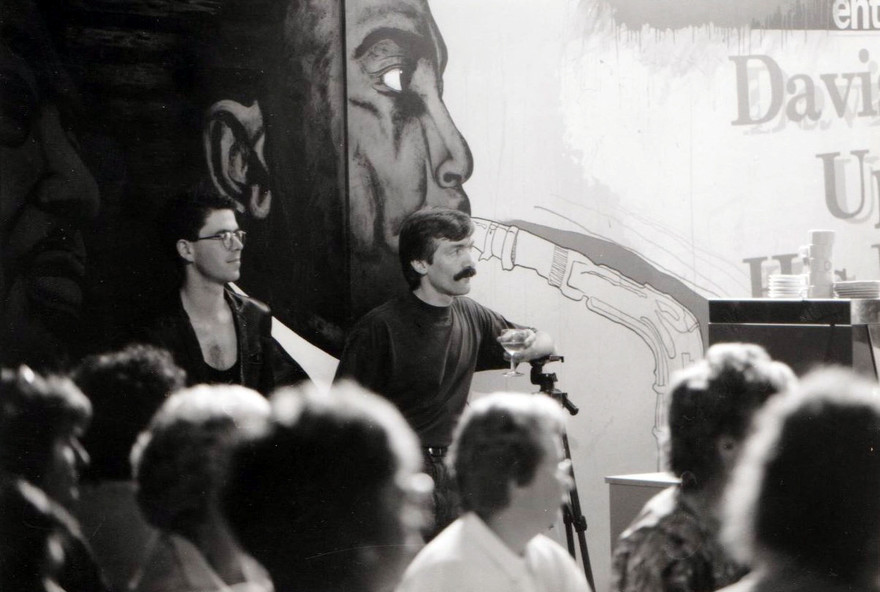
Singer-songwriter Nick Smith and Chris Priestley at Java Jive, Pompallier Terrace, Ponsonby. - Chris Priestley Collection
Straight inside the glass doors was where the bands played, protected by a pair of monitor speakers on the floor. There was no stage or dance floor, but musicians and punters mostly managed to remain on their respective sides of those speakers. Occasionally a dancer would come to grief and topple into some hapless singer.

Trudi Green and Chris Priestley at the Java Jive jukebox. - Chris Priestley Collection
And Java Jive now offered live music seven nights a week! Monday night was a blues jam, Tuesday was women performers’ night, Wednesday jazz, Thursday smooth R&B, and bands and touring acts at the weekend. A teenaged Supergroove played some of their first gigs there when they were still known as The Lowdown Dirty Blues Band.

The mainstays of Java Jive’s Women Performers’ Night, 1991. Left to right: Deb Frame, Cousin Alice, Leraine Horstmanshoff, Tania Simon, Kāren Hunter.
Paul Walker lived and breathed Java Jive. Each night would find him at The Gluepot hustling a crowd to carry on around the corner. “He was very silver-tongued,” Spiller said. “He could charm most people with his laid-back attitude and ‘devil may care’ glint in his eye. I ran all the business side of it. I was there during the day and some of the nights, but I’m not made of the same stuff that Paul was, that’s for sure. Paul would wake up at one o’clock in the afternoon and go through till three or four or five in the morning.”

Beaver at Java Jive.
The early-morning finish meant Java Jive was the only place open after international touring acts had ended their shows. Among those to make it down to the blues jam after a Monday night show at the Auckland Town Hall were Buddy Guy, Junior Wells, and Jeff Healey.
Originally working as a dishwasher during Chris Priestley’s era, Paul “Boggy” Bognuda progressed to waiter and maître d’ under Walker and eventually became his right-hand man. He also hosted the blues jam as Blue Buffoons with Shayn Wills and Bullfrog Rata.
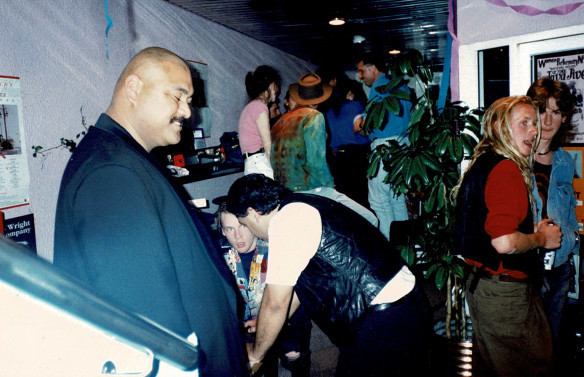
Gentleman doorman Selwyn Kepa looms large while bluesmen Bullfrog Rata (black leather vest) and Shayn Wills discuss the next set at Java Jive, early 1990s. To the left is the corridor through to the private car park. - Alison James collection
“Music didn’t start sometimes till 11 o’clock at night,” Bognuda said. “So, we’d just tell the diners if they were staying for the show, it’s a $10 cover charge; either stay or go. [Doorman] Selwyn Kepa was a total legend. Girls used to bring him flowers. He was absolutely brilliant. Used to wear a black-and-white tuxedo. Everyone knew him, so we hardly ever had any trouble.”

Java Jive Café country nights, 1993. Left to right, Rob Galley, Jono Lonie (obscured), Paul Walker, Glen Moffatt, Jeremy Dart. - Photo by Billy Lawry
That was the situation when I first set foot in the place in the middle of 1992. Six months after moving up from Napier I’d met guitarist Rob Galley who invited me to the Java’s new Sunday night country jam when the planned singer/host had opted out. Alongside Galley, the band included Jono Lonie on fiddle, Murray Pomare on drums and Paul Walker himself on bass.

The early days of the country jam at Java Jive, circa 1992. Left to right: Wayne Baird (obscured), Marian Burns, Murray Pomare, Glen Moffatt, Paul Walker. - Glen Moffatt collection
It was the start of a mostly glorious three-and-a-bit-year run there for me that saw lengthy service from the original line-up as well as guitarists Jeremy Dart and Wayne Baird, bass players Cameron Miller and Alastair Dougal, drummers Denis Winters, Scott Rogers, Gordon Joll and Mike Abbott, pedal-steel guitarist Red McKelvie and, when we were lucky, pianist Stuart Pearce. The night was never complete without Walker giving us John Lennon’s ‘Crippled Inside’ and his own ‘Sojoes’, an ode to the Ponsonby restaurant.

Java Jive Café country nights, 1994 (L-R): Jono Lonie, Jeremy Dart, Glen Moffatt, Mike Abbott (obscured), Alastair Dougal, Red McKelvie.
Whenever a break was suggested, Walker would encourage us to do another couple of songs. He’d hold up a sign that read “beer” and bar staff would promptly arrive with a round. As well as singers from the audience, members of the New Zealand old guard such as Bunny Walters, Tommy Ferguson and Shane would get up. One night, Joe Walsh of the Eagles sat in for ‘Lawdy Miss Clawdy’, and on another, Byrds sideman Earl Poole Ball joined in after playing at the Auckland Town Hall with Johnny Cash and June Carter.
Still a couple of years away from the Eagles reconvening, Walsh was probably the first international musician to autograph their home state on the partial US map that was part of Martin Page’s mural. In the early days of the practice, it wasn’t uncommon for an owner/manager to chide an unsuspecting staffer as they set about scrubbing off the “graffiti”.

Blues at Java Jive, 1991. Left to right: Darren Watson, Gary Verberne, unidentified bass player, Dave Murphy. - Darren Watson collection
By the end of 1992, with Walker and Beaver’s marriage at an end, Walker and Spiller had had enough and sold to live music fans Mike Gin, Paul Ding and Victor Young. Walker stayed on for around a month to assist with the handover and remained playing in bands there until moving on to The Powerstation.
Gin and co had no experience of running a bar, but thought it was a good idea. “We were a bit young and stupid probably,” he laughed. “We saw the ad in the paper for the Java Jive, and obviously Java Jive was pretty well known, so we said, ‘Wow, yeah, that’s a pretty cool place. Let’s have a look,’ and ended up buying it.”
While Ding and Young stayed behind the scenes, Gin was the public face of the new owners, and it was business as usual. Walker with his big book of contacts made all the introductions to the regular musicians and the focus was squarely on music. They took a real shine to veteran bluesman Sonny Day, who was by now running the blues jam.
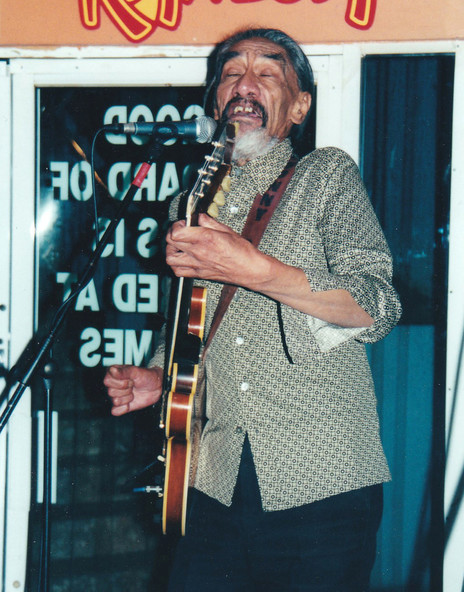
Sonny Day performing at Java Jive.
“The country Sunday and blues Monday nights were the most iconic nights,” Gin said. “We also had CMB Swing, Carl Mose Band, that did an a capella soul night which drew a good crowd into the Java on a Thursday night. Andrew White, supreme guitarist and songwriter, was a regular at the bar and played a few nights. He had a band called The Rainmen, which had a regular gig at The Gluepot.
“I guess we liked the concept of the music, and we sort of established a good relationship with the musos and kept that as the core part of the Java. But the restaurant part, we weren’t so good at that. The Java was quite a cool place, it had an aura about it. I just enjoyed the scene that it was part of because The Gluepot and the Java sort of lived off each other in a way. So that was quite cool. And then there was the Alhambra.”
But the pressure of the lifestyle and keeping the restaurant side afloat saw the trio sell to husband-and-wife Jan and Kristine Breukers in March or April of 1994. Theirs would prove to be the longest tenure. Fresh in the country, both had been involved in live music and bar management in the Netherlands and looked forward to the challenge of running a bar in their adopted home country’s biggest city.
--